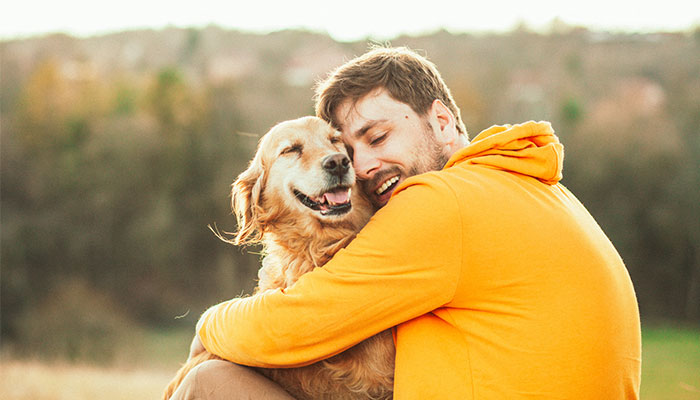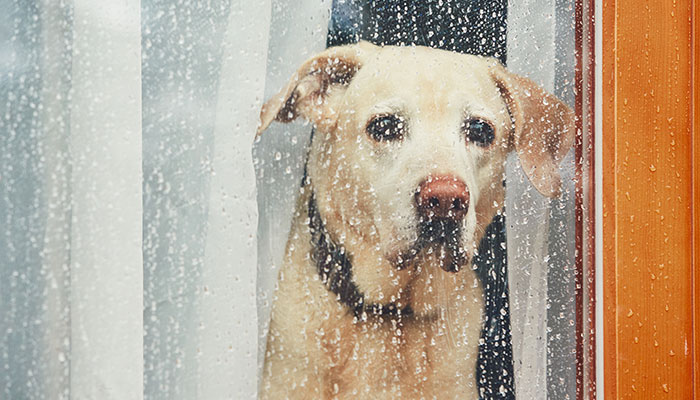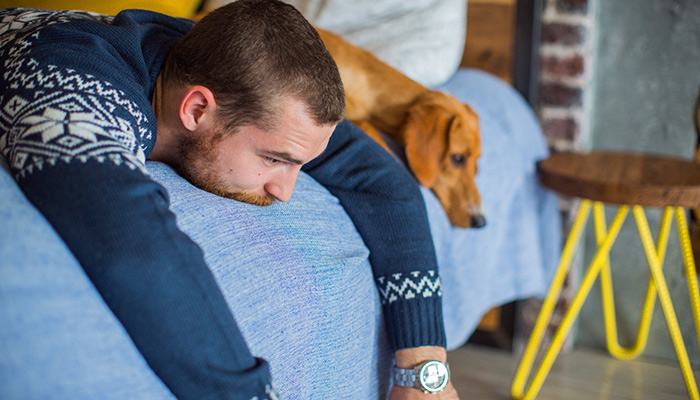As lockdown restrictions relax, veterinarians around the world have spoken about pets dealing with separation anxiety and a sense of abandonment when their owners return to the workplace.

Both ways: while vets expect pets to experience separation anxiety as people slowly return to work post-lockdown, many pet owners may also feel sad or anxious about leaving their animals, says occupational psychologist Mel Taylor.
After such intense quality time with their owners, they worry it will be traumatic for pets to go back to quieter homes, less attention and fewer walks. Tips to help them cope include easing them into a new routine by gradually increasing the time they’re left alone, adopting low-key approaches to departures and greetings, and offering a favourite toy before leaving the house.
But less has been said about the possibility that many of their human owners – more than 60 per cent of Australian households own at least one pet – will experience feelings of anxiety, or sadness, when leaving their furry friends behind.
Occupational Psychologist and Macquarie University Associate Professor Mel Taylor says pets can help reduce stress, improve mood, fight depression, reduce loneliness and improve overall wellbeing.
Through the coronavirus crisis, the pets have been there to support us through all the uncertainty and anxiety that people have had about themselves and their families.
In stressful times, the benefits go even further. Hospitals, schools, nursing homes and district courts engage therapy dogs to calm stressed humans, horses are used in equine-assisted therapy for those with PTSD, fish are placed in waiting rooms for relaxation purposes, and crisis response dogs are used in emergency management settings in Australia
“Through the coronavirus crisis, the pets have been there to support us through all the uncertainty and anxiety that people have had about themselves and their families,” Dr Taylor says. “They are great at calming us, providing unconditional love, and giving us something else to focus on.”
Have a plan
Dr Taylor has experienced this first hand : she owns two dogs, three cats and a galah, and has been relishing the extra time with her older dog, recently diagnosed with cancer.
“Being at home has been so precious to me because I have been able to spend all this extra time with her, not knowing how much longer she will be with me. But I suspect a lot of other people have benefited from spending time with their pets, whether it’s a distraction from work during the day, or as emotional support.”

New habits: Taylor hopes new post-covid ways of working may give pet owners more flexibility and be able to keep some newly established daytime routines with their pets.
Dr Taylor has worked extensively in animal emergency management and the impacts of animal loss following bushfires and floods. Part of her work involves communicating to animal owners that the human-animal bond is a two-way street – they give you unconditional love and emotional support but as a guardian, you have the responsibility of not letting them down when a crisis hits.
In these emergency situations, she says, it is important to have a plan for your animals, and in a similar way, it’s now important to plan for the welfare of your pets as you transition back to the workplace.
Dr Taylor says that changes in routine will be especially difficult for new pet owners, and worrying that your animal is anxious will make it worse.
Many of the tips for preparing pets for increased post-COVID -19 separation can also be utilised for their human owners, including taking breaks from home in gradually increasing increments to get used to the separation and transition gently back into work. Owners should also look after their own mental health and focus on what they’ve gained: stronger bonds with pets, a healthier routine and physical and emotional benefits.
- Put down your phone: why daydreaming on the commute is crucial
- Please explain: what's behind the brawl over our borders?
Dr Taylor hopes that reflecting on the benefits of our new COIVD-19 inflicted routines will encourage people to hold onto some of their recently-established routine and take better care of themselves and their pets, leading to fewer animals being neglected, returned or abandoned.
And there could be positive signs ahead: an American pet hospital survey of 1000 dog and cat owners has recently found that, during the pandemic, 84 per cent of pet owners have become more conscious of their pet's health and 67 per cent plan to change how they care for their pets.
Renewed motivation
Dr Taylor is hopeful about the future. “The extra time we’ve had with pets could be a drawcard for us to try to push for new deals, and hopefully employers will be open to more flexible approaches to working from home, and in the short term the reduced capacity on public transport may help to drive change, staggering start and finish hours,” she says.
“When you know how nice it has been to spend additional time with your pet, you won’t want to lose it.
"Whether you’ve been able to take longer walks with your dog, or work on training out that troublesome behaviour, or you’ve always wanted a kitten or puppy and now you’ve had the chance settle one in at home.
“Hopefully you’ll now be more motivated to work this time into your new post-COVID-19 life. Going back to old habits like rushing off in the morning to commute to work and coming home and going immediately to cook dinner won’t be as attractive now. You will need to carve out extra time for your pet and do things differently.”

Associate Professor Mel Taylor - pictured - is an Occupational Psychologist and Senior Lecturer in the Organisational Psychology team at Macquarie University. She is involved with the MAID (Managing Animals in Disasters) project with the Bushfire and Natural Hazards CRC and helps run a community-led group in the Blue Mountains called Blue ARC Animal Ready Community.



